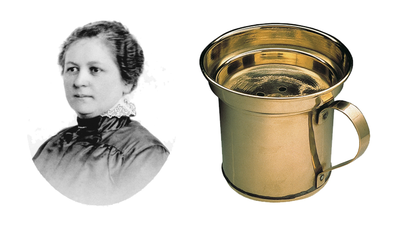ARTICLE AD BOX

Melitta Bentz in 1908, the mother who invented the paper coffee filter in her Dresden kitchen/Image: Melitta webiste
In 1908, a German mother’s frustration in her Dresden kitchen led to an invention that reshaped how billions begin their day. Melitta Bentz’s simple experiment with a brass pot, a nail, and her son’s school blotting paper gave birth to the modern coffee filter, a quiet revolution that turned bitter sludge into smooth perfection and created a global ritual that endures more than a century later.
A daily battle with bitter coffee
At the turn of the twentieth century, coffee was an ordeal. Brewing methods produced cups thick with sediment, their bitterness almost medicinal. Loose grounds were boiled directly in water, creating a gritty concoction that left residue on every sip. Alternatives offered little relief. Percolators forced boiling water repeatedly through the grounds, stripping flavour and burning the brew. Cloth filters trapped oils, collected bacteria, and were difficult to clean.
Metal sieves allowed sediment to slip through, and drinkers simply accepted it as the natural state of coffee.Melitta Bentz, then a 35-year-old housewife and mother in Dresden, refused to accept that “this is just how coffee is.” Each morning, she faced the same disappointment: another undrinkable cup. On one such morning in 1908, her patience snapped. She began scanning her kitchen for anything that might improve the process.
Her eyes fell on her young son’s school notebook, open on the table, and the blotting paper inside, thin, absorbent sheets designed to soak up excess ink.In that instant, she saw possibility.
A simple experiment, a lasting solution
Bentz fetched a small brass pot and punched several holes through its base with a hammer and nail. She cut a circle from the blotting paper and placed it over the holes, added ground coffee, and poured hot water gently over the top.What dripped through was unlike anything she had ever seen, clear, aromatic liquid, free of the grit that had plagued every previous attempt. She lifted the cup and tasted it. The bitterness was gone. The texture was smooth, the flavour rounded.That small moment of domestic ingenuity became the foundation of a global industry. Where others might have settled for personal satisfaction, Bentz recognised its potential.
Within months, she visited the Imperial Patent Office in Berlin and secured German patent no. 224,960, dated 20 June 1908, for a “coffee filtration system employing paper.”Later that year, on 15 December 1908, she established the M. Bentz Coffee Filter Company, operating from her Dresden apartment. She began with only 72 pfennigs, roughly $10 today, and the help of her family. Her husband, Hugo, managed the paperwork and accounts; her two sons assisted in producing filters by hand.They worked from their living room, cutting paper, shaping metal cones, and selling the new filters door to door. At local markets, Bentz demonstrated the device herself: “No grounds. No bitterness. Perfect coffee.” Initial scepticism was widespread, after all, coffee had always been bitter. But one taste was enough to convert doubters.
From Dresden kitchen to global brand
By 1910, Melitta’s filters were being sold throughout Germany. Two years later, the family had moved production into a small factory employing a dozen workers.
The company’s steady growth mirrored the transformation of morning routines across Europe.Through the turmoil of World War I, the firm survived by adapting production and conserving materials. The 1920s brought expansion, with Melitta filters appearing in homes and cafés far beyond Germany’s borders. Even wartime restrictions during World War II could not extinguish the enterprise; the factory was requisitioned for military goods, yet the family preserved its designs and spirit.When post-war Dresden fell within the Soviet occupation zone, the Bentz family moved west, rebuilding the business from scratch. The product itself, however, remained unchanged, a conical paper filter that produced clean, consistent coffee.Melitta Bentz managed her company until her retirement, handing control to her sons. She died in 1950, leaving behind more than a successful enterprise: she had redefined a universal habit.
The legacy of a simple idea
More than a century later, the Melitta Group remains a family-owned company, headquartered in Germany and operating in over 50 countries. Billions of its filters are used daily. The principle Bentz conceived, hot water passing through ground coffee contained in a disposable paper filter, underpins every modern brewing method, from automatic drip machines to single-serve pods and artisanal pour-overs.Every barista carefully circling water over grounds in a Chemex or Hario V60 repeats the same motion Bentz performed in her kitchen in 1908.
Whether in an office break room, a café in Tokyo, or a household in London, the lineage is direct.Her story stands as a quiet rebuke to convention. Bentz had no technical training, no business background, and no investors. She worked without institutional support in a time when few women ran companies. What she possessed was curiosity, and the refusal to accept mediocrity in the small rituals of life.The invention itself was humble, born not of laboratories or design studios but of domestic frustration.
Yet from that moment of exasperation emerged one of the most enduring pieces of kitchen innovation in modern history.
Today, when three billion people begin their day with filtered coffee, they are unknowingly participants in Melitta Bentz’s legacy. The clean, balanced flavour, free of bitterness and grit, flows directly from her experiment with a pot, a nail, and a scrap of her son’s homework paper.She did not ask permission, seek endorsement, or wait for expertise. She simply wondered, what if?In that quiet question lay a transformation that continues to shape mornings around the world. Every smooth cup of coffee, whether brewed in a machine, a press, or a handmade pour-over, carries a trace of that moment in a Dresden kitchen, when a mother’s impatience gave rise to a ritual shared by billions.

 1 hour ago
3
1 hour ago
3








 English (US) ·
English (US) ·